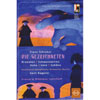Schreker (Die) Gezeichneten
Scenery-chewing melodrama that still manages high musical values
View record and artist detailsRecord and Artist Details
Composer or Director: Franz Schreker
Genre:
Opera
Label: Euroarts
Magazine Review Date: 13/2006
Media Format: Digital Versatile Disc
Media Runtime: 145
Mastering:
Stereo
Catalogue Number: 2055298

Tracks:
| Composition | Artist Credit |
|---|---|
| (Die) Gezeichneten |
Franz Schreker, Composer
Anne Schwanewilms, Calotta Nardi, Soprano Berlin Deutsches Symphony Orchestra Franz Schreker, Composer Kent Nagano, Conductor Michael Volle, Count Vitelozzo Tamare, Baritone Robert Brubaker, Alviano Salvago, Tenor Robert Hale, Duke Adorno; Capitaneo di Giustizia, Baritone Vienna State Opera Concert Choir Wolfgang Schöne, Lodovico Nardi, Baritone |
Author: Arnold Whittall
“The doomed and the damned” is a very free translation of Die Gezeichneten but it gives a good indication of the tone of this lurid tale. Schreker was his own librettist, and this, his third opera, was completed in 1915, just as Berg was getting started on Wozzeck. Berg’s opera might be even more sordid and, in places, sentimental, than Schreker’s: yet it has an emotional conviction and the power to create an overwhelming catharsis that were completely out of Schreker’s reach.
That said, this Salzburg production gives a very fair sense of why Die Gezeichneten deserves occasional revival. It is strongly cast, with major artists Robert Hale and Wolfgang Schöne in relatively minor roles. And the love/lust triangle on which it centres – Carlotta, a demented painter, and her two noble lovers in 16th-century Genoa, the brutal Tamare and the more vulnerable, hunchbacked Salvago – is magnificently realised, with Nikolaus Lehnhoff ensuring that scenery-chewing melodrama doesn’t get in the way of musical values. Nor does Lehnhoff shrink from depicting the implications of the opera’s references to the corruption of children.
As a result, the final confrontation between Tamare and Salvago is riveting, Michael Volle and Robert Brubaker sustaining their physically and musically demanding roles with stamina allied to a good sense of line. Brubaker is especially impressive, coping with the producer’s decision to make Salvago a cross-dressing weakling, rather than the ugly hunchback envisaged by Schreker. As Carlotta, Anne Schwanewilms whitens her tone to suggest derangement a little too readily, but she looks the part, and brings as much depth and range of characterisation to it as Schreker’s music allows.
The filming is efficient: perspiration-ridden close-ups are not excessive and a clear impression emerges of the gigantic obstacle-course set – not as inhibiting to the singers as some other recent examples. Lighting and costumes also contribute vitally to the decadent atmosphere within which the drama unfolds. Most crucial of all is conductor Kent Nagano’s evident concern to ensure that the music flows along without its welter of passing details being lingered over or needlessly underlined. There are no extras, and only a very basic introduction in the booklet.
That said, this Salzburg production gives a very fair sense of why Die Gezeichneten deserves occasional revival. It is strongly cast, with major artists Robert Hale and Wolfgang Schöne in relatively minor roles. And the love/lust triangle on which it centres – Carlotta, a demented painter, and her two noble lovers in 16th-century Genoa, the brutal Tamare and the more vulnerable, hunchbacked Salvago – is magnificently realised, with Nikolaus Lehnhoff ensuring that scenery-chewing melodrama doesn’t get in the way of musical values. Nor does Lehnhoff shrink from depicting the implications of the opera’s references to the corruption of children.
As a result, the final confrontation between Tamare and Salvago is riveting, Michael Volle and Robert Brubaker sustaining their physically and musically demanding roles with stamina allied to a good sense of line. Brubaker is especially impressive, coping with the producer’s decision to make Salvago a cross-dressing weakling, rather than the ugly hunchback envisaged by Schreker. As Carlotta, Anne Schwanewilms whitens her tone to suggest derangement a little too readily, but she looks the part, and brings as much depth and range of characterisation to it as Schreker’s music allows.
The filming is efficient: perspiration-ridden close-ups are not excessive and a clear impression emerges of the gigantic obstacle-course set – not as inhibiting to the singers as some other recent examples. Lighting and costumes also contribute vitally to the decadent atmosphere within which the drama unfolds. Most crucial of all is conductor Kent Nagano’s evident concern to ensure that the music flows along without its welter of passing details being lingered over or needlessly underlined. There are no extras, and only a very basic introduction in the booklet.
Discover the world's largest classical music catalogue with Presto Music.

Gramophone Digital Club
- Digital Edition
- Digital Archive
- Reviews Database
- Full website access
From £8.75 / month
Subscribe
Gramophone Full Club
- Print Edition
- Digital Edition
- Digital Archive
- Reviews Database
- Full website access
From £11.00 / month
Subscribe
If you are a library, university or other organisation that would be interested in an institutional subscription to Gramophone please click here for further information.




